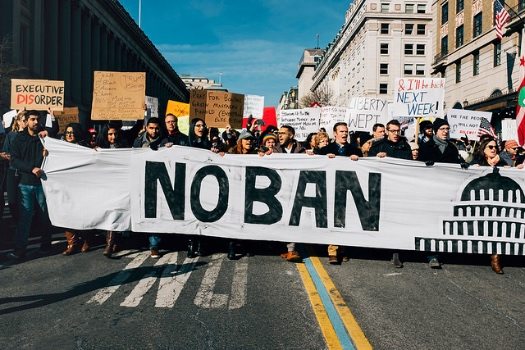
May 25, 2017; Washington Post
Indeed, this case is unique not because we are considering campaign statements, but because we have such directly relevant and probative statements of government purpose at all. See Smith v. Town of Clarkton, 682 F.2d 1055, 1064 (4th Cir. 1982) (observing that government actors “seldom, if ever, announce on the record that they are pursuing a particular course of action because of their desire to discriminate”). To the extent that our review chills campaign promises to condemn and exclude entire religious groups, we think that a welcome restraint.
The above statement comes from a 10 – 3 ruling by the U.S. Court of Appeals – 4th Circuit, which yesterday maintained the injunction on President Trump’s early temporary “travel ban” that attempted to bar travel from seven majority Muslim countries for a 90-day period beginning in late January. This ruling upholds a similar decision made in March by U.S. District Judge Theodore D. Chuang in Maryland, who also found that the order violated the constitution.
The decision, written by Chief Judge Roger L. Gregory, found that the executive order “in context drips with religious intolerance, animus and discrimination.” Further, the president’s authority “cannot go unchecked when, as here, the president wields it through an executive edict that stands to cause irreparable harm to individuals across this nation.”
Referring to a variety of communications from the Trump campaign and administration, it continued, “Plaintiffs point to ample evidence that national security is not the true reason” for the order, “including, among other things, then-candidate Trump’s numerous campaign statements expressing animus towards the Islamic faith.”
Sign up for our free newsletters
Subscribe to NPQ's newsletters to have our top stories delivered directly to your inbox.
By signing up, you agree to our privacy policy and terms of use, and to receive messages from NPQ and our partners.
This use of Trump’s own words to prove the real intent behind some of his presidential orders has become a mainstay of the cases brought against him on immigration issues, and there is no dearth of fodder:
Candidate Trump later recharacterized his call to ban Muslims as a ban on nationals from certain countries or territories. On July 17, 2016, when asked about a tweet that said, “Calls to ban Muslims from entering the U.S. are offensive and unconstitutional,” then-candidate Trump responded, “So you call it territories. OK? We’re gonna do territories.” He echoed this statement a week later in an interview with NBC’s Meet the Press. When asked whether he had “pulled back” on his “Muslim ban,” Trump replied, “We must immediately suspend immigration from any nation that has been compromised by terrorism until such time as proven vetting mechanisms have been put in place.”
Trump added, “I actually don’t think it’s a rollback. In fact, you could say it’s an expansion. I’m looking now at territories. People were so upset when I used the word ‘Muslim.’ Oh, you can’t use the word ‘Muslim.’ Remember this. And I’m okay with that, because I’m talking territory instead of Muslim.”
Trump continued, “Our Constitution is great….Now, we have a religious, you know, everybody wants to be protected. And that’s great. And that’s the wonderful part of our Constitution. I view it differently.”
Declaring oneself at odds with the Constitution and trying to show the public how smart you are through confessing to misrepresentation of intent on film was probably not a good idea. This ruling termed it a clear indication of “bad faith” and ruled accordingly. Attorney General Jeff Sessions, saying that the administration “strongly disagrees,” has said the government will appeal to the U.S. Supreme Court.—Ruth McCambridge













